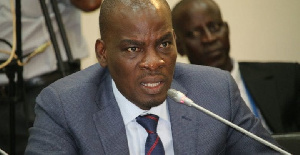 Minority Leader Haruna IIdrisu
Minority Leader Haruna IIdrisu
The Minority in Parliament has described the Emirati and Norwegian middlemen contracted by the government to secure the Sputnik vaccine as imposters who are seeking to defraud the country in the quest to procure the vaccines.
Minority Leader Haruna IIdrisu is daring government to name the deputy Russian ambassador they claim they have dealt with in an attempt to get the Sputnik V.
Speaking to the media in parliament, the minority says the Sputnik contract signed between Ghana and the third party is not in the interest of the country, there it must be halted.
“We state without fear of contradiction that even this transaction qualifies to be an international economic transaction within the meaning of Article 181(5) of the 1992 Constitution and therefore, failure to have parliamentary approval or better still ratification of it leaves it walking an illegal transaction per the laws of the land,” he said. “We will be happy to see what the opinion of of the Attorney General will be on this particular transaction but we are interested in the cost over run and the unjustified, exorbitant payment of COVID vaccines using middlemen,” he added.
Foreign Affairs Minister, Shirley Ayorkor Botchway justified the decision by the government to use a middleman to procure the Sputnik V Vaccine.
She said at a press conference in Accra on Monday, June 14 that it has not been easy to get the vaccines directly from the manufacturers.
“It has not been easy at all. Not just for Ghana, but for any of our country and not just for Africa but also for other countries around the world.
“Whether we were involved. Yes we were involved and I can assure you that it is difficult to procure vaccines directly from manufacturers,” she said.
“It is difficult, extremely so even if you have money to procure vaccines from the source. It is almost impossible and so we made contact and we still continue to pursue getting the vaccines. It has not been easy.
“Whether we were involved? Yes from the beginning we were involved but I can assure you that it is difficult to procure vaccines directly from manufacturers but whatever decision government takes, the responsibility is all of us. It is a collective responsibility and it is a collective decision that was taken. Government will only take that decision if all avenues are closed to it.”
Ghana has been cited in an investigative report in a Norwegian newspaper Vergens Gang for agreeing to procure the Sputnik V vaccines from a businessman at a unit price of $19 instead of $10.
The Ministry of Health has justified the purchase of Sputnik V vaccines at almost double the factory price, emphasising the negotiations were held at a time of scarcity of the products across the globe.
But a statement issued by the Ministry of Health on Wednesday, June 9 said: “We were torn between accepting the price to enable us have access to the vaccine or facing the situation of the seller withdrawing from the negotiations, to the extent that the 15,000 doses that had been shipped to Ghana were going to be rerouted to other countries.”
The statement signed by the Chief Director of the Ministry, Kwabena Boadu Oku-Afari, noted that the government was unable to obtain direct supplies of the vaccines from the Russian government and so had to resort to one Sheikh Ahmed Dalmook Al Maktoum of the United Arab Emirates (UAE) for the supplies.
According to the Ministry, $10 was the ex-factory price but the Emirati offered to sell the vaccines at $25 per dose.
This was slashed by $6 after negotiations, according to the statement.
This is the result of the cost build-up to the ex-factory price of US$10 per dose, taking into account land transportation, shipment, insurance, handling and special storage charges, as explained by the seller.
“These are the factors which led us to agree the final price of US$19 per dose,” the Ministry stressed.
It has assured Ghanaians that “it will endeavour to secure vaccines for the Ghanaian people, despite global shortages and cognisant of price and legal considerations”.